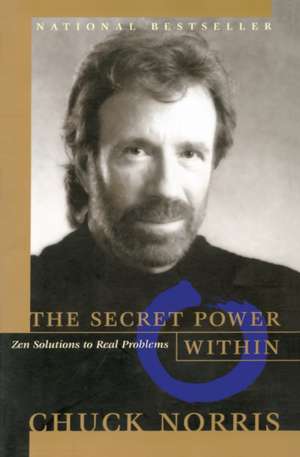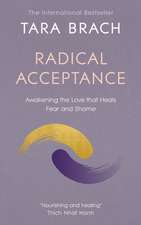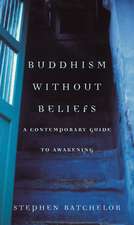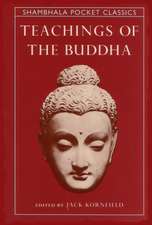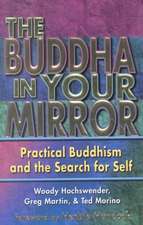The Secret Power Within
Autor Chuck Norrisen Limba Engleză Paperback – 31 dec 1996
personal struggles and triumphs, Norris explains how the ancient system of Zen--the core philosophy behind the martial arts--can help each of us achieve
spiritual tranquillity and self-confidence.
The Secret Power Within is both a highly accessible lesson in Zen philosophy as well as the compelling story of Chuck Norris's own remarkable success. In this highly entertaining and inspiring account, Norris shows how Zen can be applicable to everyday situations, from the conference room to the
living room. Chapters include:
* Winning by Losing: If you have nothing to prove, you have no need to fight.
* Complete the Wheel: How to balance your life to achieve success.
* Your Master, Your Art: To maintain self-respect you must respect the work you do, and do it as well as possible.
* My Way of Meditating: Norris's personal technique for achieving tranquillity under pressure.
The message is simple: There are no limits for the person who refuses to accept them.
Preț: 89.41 lei
Nou
Puncte Express: 134
Preț estimativ în valută:
17.11€ • 17.91$ • 14.16£
17.11€ • 17.91$ • 14.16£
Carte disponibilă
Livrare economică 15-29 martie
Preluare comenzi: 021 569.72.76
Specificații
ISBN-13: 9780553069082
ISBN-10: 055306908X
Pagini: 192
Dimensiuni: 140 x 208 x 15 mm
Greutate: 0.19 kg
Ediția:Broadway Books.
Editura: HARMONY
ISBN-10: 055306908X
Pagini: 192
Dimensiuni: 140 x 208 x 15 mm
Greutate: 0.19 kg
Ediția:Broadway Books.
Editura: HARMONY
Notă biografică
Chuck Norris, currently starring in his CBS-TV show Walker, Texas Ranger, is a world-champion martial arts master and star of many popular action films. He is the author of the New York Times bestseller The Secret of Inner Strength, his autobiography.
Extras
PREFACE
My first experience with Zen was in 1962 in Torrance, California. I was a young black belt and I had just started a martial arts school, which was one of the first in the Los Angeles area. The school, located in what had been a store, was right on the corner of two main streets. Cars passing by would slow down to look through the big windows, and people would often just walk in off the street to watch the classes for a while--a karate class was something unusual back then. From time to time a monk wearing the saffron robes of a Buddhist would drop by. I'd see him come in, be aware of him sitting there quietly watching me teach my students, and then I'd look up to find that he was gone.
One day, at the end of a session, I went over to talk with him before he could leave. I learned he was from the Yogananda temple in downtown Los Angeles and that he, too, was a martial artist. The fact that we were both martial artists made him feel a certain kinship with me, and he had a lot he wanted to share. As we chatted, he mentioned the word ki several times, which he described as an internal force and said was related to Zen.
Zen: Today that little word has been reduced to a kind of catchphrase that can be attached to everything from learning to use the Internet to getting ahead in the business world. It has been detached from its original source so thoroughly that its meaning, at least for a great many people, has become a matter of personal conjecture. I doubt it would be used quite so often if people had to use its full name, Zen Buddhism, which is what the monk was talking about.
Although I had earned my black belt while I was in the air force in Korea I knew nothing about Zen. My Korean instructor had rarely mentioned it, at least not that I was aware of, for he spoke very little English, and although he could make himself understood when need be, he was most comfortable with a series of shouted commands. I'd heard of ki, however, but it seemed vaguely mysterious, almost magical. And here was this monk talking about it as though it were something nearby.
Curious to learn more about both Zen and ki, I asked the monk more questions. He said, "Let's step on the mat [training area]."
My students for the day were gone, so I locked the front door and faced him on the mat.
"Kneel down and close your eyes," he said, "and concentrate on the third eye, which is between and slightly above your eyes. Focus on that third eye and concentrate."
I knelt on the floor, closed my eyes, and staring into that blackness I soon saw a dark spot about the size of a dime that was starting to get brighter.
As I was kneeling there, the monk told me more about ki.
From what he said I understood only that ki was some kind of universal force, everywhere around us, and that certain people were able to make use of it. He told me stories about the exploits of various monks and warriors in the fourteenth and fifteenth centuries, stories that involved using the power of ki. One of the stories was about a samurai who was set upon in the woods by a pack of wolves, but he just kept walking straight ahead, his countenance so stable, so self-aware yet potentially explosive that the animals were frozen in their tracks, and he passed safely through their midst. Another was about men lying in ambush to confront a victim who simply by gazing at them terrorized them so effectively that they were immobilized. While he was telling me these stories, the dark spot became as bright as the sun.
The monk finally told me to open my eyes, and when I did so, it was like waking up: I discovered I'd been kneeling on the mat for four hours. When I tried to get up I felt excruciating pain--the circulation in my legs had been cut off. The monk massaged my legs until the blood was flowing again. Then he said good-bye. After that experience, I went to the Yogananda temple in Los Angeles several times. The monk tried to convince me to convert, but my Christian faith was too strong.
But that was when I first became aware that there was more to the martial arts than just the physical, and it was a turning point in my life. I've spoken to various people about that monk and the "third eye," and I can't say I've ever had a satisfactory explanation. But it was my first experience with Zen, and weird as it was, it piqued my curiosity.
That was more than thirty years ago, and over the years my understanding of that other side of the martial arts has grown considerably. In the end, the idea of a third eye helps in an understanding of Zen, since Zen is another way of seeing--you could even say a way of seeing with both your eyes closed.
This book is about what I've seen and understood by looking through Zen. It's about my life and the lives of people I've known, about real-life experiences that are in some way related to Zen or that make a special kind of sense when looked at in Zen terms. A lot of the stories here are from my background as a martial artist, because the arts and Zen are closely related. I entered Zen through the martial arts, beginning with the monk in his saffron robes, but studying martial arts is certainly not the only way to come to an understanding of Zen.
Some people come to Zen suddenly; after all, in its purest form, Zen is usually understood not just as "enlightenment," but as "sudden enlightenment," something like waking up from a deep sleep or from a deep "distraction," meaning, waking up from the superficial confusions of this world. The stories of Zen adepts (experts) who have achieved such sudden awakenings are exciting to read and say a lot not just about Zen but about what Zen can mean today, how it can fit into our world. And it really does fit. People have reached enlightenment riding to work in a van crowded with carpoolers; some have reached enlightenment while shaving or leaning over to pick up a newspaper.
Enlightenment is real and is within our grasp all the time; at any moment we may awaken from our current perception of the world around us to another view altogether. With such enlightenment, nothing changes except our point of view, and that changes everything forever.
I don't know what total enlightenment would be like, but I've had glimpses, and such glimpses are what I offer here. These are views into what is really happening in life, suggestions for finally agreeing on the meaning of success and happiness and for recognizing them when they come. After reading this book, you should come away with an increased understanding of Zen and how its thinking can improve your life and enable you to take and fully experience those first steps toward increased awareness. With all of its age-old power and wisdom, all of its experience and deep compassion, Zen wants you to find yourself. Zen actively wants you to achieve happiness and be content with your life. Enlightenment is the goal, it is the future; but just deciding to take the right steps, just facing in the right direction, can have a powerful impact on today, on how you live your life every moment from now on. There can be no doubt that Zen can be applied to any life--Zen can be entered by anyone, anywhere--and I'm convinced that the application will always be beneficial, since Zen begins and ends at the most human level, with how people think of themselves and others. The first decision is simply to let Zen help you, let it do what it is designed to do. And that isn't hard. The only requirement is you yourself: You are all that you will ever need in order to begin.
Looking at Zen with a completely open mind is essential; and with traditional Zen irony, I could add that one possible purpose of Zen is to open your mind. Zen is like that: The ideas roll and turn in on themselves. To give a sense of that aspect of Zen, I've included some of my favorite Zen stories and aphorisms in this book, most of them ancient, some of them modern reworkings of older tales. Although many of these bits of Zen wisdom have something to say about life, their purpose is not to teach lessons, at least not in our usual Western sense. In fact, it's important to realize that there are no right or wrong answers to Zen questions. The object of all these stories and aphorisms is to make you move your mind, use your mind, in the same way as a physical exercise makes you move and use your body. If you keep at Zen long enough, trying to work out questions that have no "correct" answer, you'll find yourself able to move your mind in new ways and you'll gradually find yourself in possession of new strengths with which you can expand your mental horizons.
An important aspect of Zen that I've come to value is that it teaches us that we're not alone. At heart, we all want the same thing, whether we call it "enlightenment," "happiness," or "love." Too many people spend their lives waiting for that something to arrive--and that's not the Zen way. Zen is always on the side of action, always on the side of doing whatever is necessary and right, so that people can live rewarding lives. Within Zen, we all share a certain kinship.
In writing this book I've had to look back over my life. I've come to realize that although the many steps I took to arrive at the present now seem inevitable, even obvious, the truth is, at the time, each step could have gone another way. Sometimes it was like a compass needle spinning, and I had to somehow locate my own personal north. In this book I try to show the way I came into Zen and how I applied it as I moved through life, but I don't necessarily mean for you to follow me, to take the same route I took, or even to look at Zen in the same way. Rather, I suggest you move ahead with Zen following your own route, beginning now.
I am a contemporary man, not a Zen master, but I put this book forward with the belief that it will help others apply Zen, or at least the wisdom behind Zen, to real-life situations. Any such application will be subtle and only a matter of interpretation, of course. Books about Zen are widely regarded as useless; according to that line of reasoning, Zen cannot be understood from the outside, from the point of view of an observer, regardless of how eager to learn that observer might be.
I would probably agree with that in principle. When Westerners encounter actual examples of Zen, they often come away confused, if not disappointed. A tea ceremony can be an act of Zen, as can flower arranging, calligraphy, or archery. And what happens? The tea master never seems to get around to actually pouring the tea; the flower arranger puts more effort into untying the bunches of flowers than into arranging them; the calligrapher dedicates most of his energy to preparing his various brushes; and although the archer makes convincing movements with his bow, he seems completely oblivious to such matters as aiming at his target--he doesn't seem to care whether or not he even hits it.
But he hits it, just as the calligrapher ultimately creates a beautiful and harmonious page. Learning to see each of those arts, like the martial arts, as a ceremony is to begin to understand. Coming to see beyond the ceremony to the practice and dedication, the respect and discipline, that makes an art possible is to reach an even deeper understanding.
The sure aim of the archer and the quick touch of the calligrapher may seem unrelated to our day-to-day lives; but the Zen that inwardly powers those movements, that makes them possible in the first place, can be applied everywhere by everyone who wishes to develop the secret power within, a power we all have.
My first experience with Zen was in 1962 in Torrance, California. I was a young black belt and I had just started a martial arts school, which was one of the first in the Los Angeles area. The school, located in what had been a store, was right on the corner of two main streets. Cars passing by would slow down to look through the big windows, and people would often just walk in off the street to watch the classes for a while--a karate class was something unusual back then. From time to time a monk wearing the saffron robes of a Buddhist would drop by. I'd see him come in, be aware of him sitting there quietly watching me teach my students, and then I'd look up to find that he was gone.
One day, at the end of a session, I went over to talk with him before he could leave. I learned he was from the Yogananda temple in downtown Los Angeles and that he, too, was a martial artist. The fact that we were both martial artists made him feel a certain kinship with me, and he had a lot he wanted to share. As we chatted, he mentioned the word ki several times, which he described as an internal force and said was related to Zen.
Zen: Today that little word has been reduced to a kind of catchphrase that can be attached to everything from learning to use the Internet to getting ahead in the business world. It has been detached from its original source so thoroughly that its meaning, at least for a great many people, has become a matter of personal conjecture. I doubt it would be used quite so often if people had to use its full name, Zen Buddhism, which is what the monk was talking about.
Although I had earned my black belt while I was in the air force in Korea I knew nothing about Zen. My Korean instructor had rarely mentioned it, at least not that I was aware of, for he spoke very little English, and although he could make himself understood when need be, he was most comfortable with a series of shouted commands. I'd heard of ki, however, but it seemed vaguely mysterious, almost magical. And here was this monk talking about it as though it were something nearby.
Curious to learn more about both Zen and ki, I asked the monk more questions. He said, "Let's step on the mat [training area]."
My students for the day were gone, so I locked the front door and faced him on the mat.
"Kneel down and close your eyes," he said, "and concentrate on the third eye, which is between and slightly above your eyes. Focus on that third eye and concentrate."
I knelt on the floor, closed my eyes, and staring into that blackness I soon saw a dark spot about the size of a dime that was starting to get brighter.
As I was kneeling there, the monk told me more about ki.
From what he said I understood only that ki was some kind of universal force, everywhere around us, and that certain people were able to make use of it. He told me stories about the exploits of various monks and warriors in the fourteenth and fifteenth centuries, stories that involved using the power of ki. One of the stories was about a samurai who was set upon in the woods by a pack of wolves, but he just kept walking straight ahead, his countenance so stable, so self-aware yet potentially explosive that the animals were frozen in their tracks, and he passed safely through their midst. Another was about men lying in ambush to confront a victim who simply by gazing at them terrorized them so effectively that they were immobilized. While he was telling me these stories, the dark spot became as bright as the sun.
The monk finally told me to open my eyes, and when I did so, it was like waking up: I discovered I'd been kneeling on the mat for four hours. When I tried to get up I felt excruciating pain--the circulation in my legs had been cut off. The monk massaged my legs until the blood was flowing again. Then he said good-bye. After that experience, I went to the Yogananda temple in Los Angeles several times. The monk tried to convince me to convert, but my Christian faith was too strong.
But that was when I first became aware that there was more to the martial arts than just the physical, and it was a turning point in my life. I've spoken to various people about that monk and the "third eye," and I can't say I've ever had a satisfactory explanation. But it was my first experience with Zen, and weird as it was, it piqued my curiosity.
That was more than thirty years ago, and over the years my understanding of that other side of the martial arts has grown considerably. In the end, the idea of a third eye helps in an understanding of Zen, since Zen is another way of seeing--you could even say a way of seeing with both your eyes closed.
This book is about what I've seen and understood by looking through Zen. It's about my life and the lives of people I've known, about real-life experiences that are in some way related to Zen or that make a special kind of sense when looked at in Zen terms. A lot of the stories here are from my background as a martial artist, because the arts and Zen are closely related. I entered Zen through the martial arts, beginning with the monk in his saffron robes, but studying martial arts is certainly not the only way to come to an understanding of Zen.
Some people come to Zen suddenly; after all, in its purest form, Zen is usually understood not just as "enlightenment," but as "sudden enlightenment," something like waking up from a deep sleep or from a deep "distraction," meaning, waking up from the superficial confusions of this world. The stories of Zen adepts (experts) who have achieved such sudden awakenings are exciting to read and say a lot not just about Zen but about what Zen can mean today, how it can fit into our world. And it really does fit. People have reached enlightenment riding to work in a van crowded with carpoolers; some have reached enlightenment while shaving or leaning over to pick up a newspaper.
Enlightenment is real and is within our grasp all the time; at any moment we may awaken from our current perception of the world around us to another view altogether. With such enlightenment, nothing changes except our point of view, and that changes everything forever.
I don't know what total enlightenment would be like, but I've had glimpses, and such glimpses are what I offer here. These are views into what is really happening in life, suggestions for finally agreeing on the meaning of success and happiness and for recognizing them when they come. After reading this book, you should come away with an increased understanding of Zen and how its thinking can improve your life and enable you to take and fully experience those first steps toward increased awareness. With all of its age-old power and wisdom, all of its experience and deep compassion, Zen wants you to find yourself. Zen actively wants you to achieve happiness and be content with your life. Enlightenment is the goal, it is the future; but just deciding to take the right steps, just facing in the right direction, can have a powerful impact on today, on how you live your life every moment from now on. There can be no doubt that Zen can be applied to any life--Zen can be entered by anyone, anywhere--and I'm convinced that the application will always be beneficial, since Zen begins and ends at the most human level, with how people think of themselves and others. The first decision is simply to let Zen help you, let it do what it is designed to do. And that isn't hard. The only requirement is you yourself: You are all that you will ever need in order to begin.
Looking at Zen with a completely open mind is essential; and with traditional Zen irony, I could add that one possible purpose of Zen is to open your mind. Zen is like that: The ideas roll and turn in on themselves. To give a sense of that aspect of Zen, I've included some of my favorite Zen stories and aphorisms in this book, most of them ancient, some of them modern reworkings of older tales. Although many of these bits of Zen wisdom have something to say about life, their purpose is not to teach lessons, at least not in our usual Western sense. In fact, it's important to realize that there are no right or wrong answers to Zen questions. The object of all these stories and aphorisms is to make you move your mind, use your mind, in the same way as a physical exercise makes you move and use your body. If you keep at Zen long enough, trying to work out questions that have no "correct" answer, you'll find yourself able to move your mind in new ways and you'll gradually find yourself in possession of new strengths with which you can expand your mental horizons.
An important aspect of Zen that I've come to value is that it teaches us that we're not alone. At heart, we all want the same thing, whether we call it "enlightenment," "happiness," or "love." Too many people spend their lives waiting for that something to arrive--and that's not the Zen way. Zen is always on the side of action, always on the side of doing whatever is necessary and right, so that people can live rewarding lives. Within Zen, we all share a certain kinship.
In writing this book I've had to look back over my life. I've come to realize that although the many steps I took to arrive at the present now seem inevitable, even obvious, the truth is, at the time, each step could have gone another way. Sometimes it was like a compass needle spinning, and I had to somehow locate my own personal north. In this book I try to show the way I came into Zen and how I applied it as I moved through life, but I don't necessarily mean for you to follow me, to take the same route I took, or even to look at Zen in the same way. Rather, I suggest you move ahead with Zen following your own route, beginning now.
I am a contemporary man, not a Zen master, but I put this book forward with the belief that it will help others apply Zen, or at least the wisdom behind Zen, to real-life situations. Any such application will be subtle and only a matter of interpretation, of course. Books about Zen are widely regarded as useless; according to that line of reasoning, Zen cannot be understood from the outside, from the point of view of an observer, regardless of how eager to learn that observer might be.
I would probably agree with that in principle. When Westerners encounter actual examples of Zen, they often come away confused, if not disappointed. A tea ceremony can be an act of Zen, as can flower arranging, calligraphy, or archery. And what happens? The tea master never seems to get around to actually pouring the tea; the flower arranger puts more effort into untying the bunches of flowers than into arranging them; the calligrapher dedicates most of his energy to preparing his various brushes; and although the archer makes convincing movements with his bow, he seems completely oblivious to such matters as aiming at his target--he doesn't seem to care whether or not he even hits it.
But he hits it, just as the calligrapher ultimately creates a beautiful and harmonious page. Learning to see each of those arts, like the martial arts, as a ceremony is to begin to understand. Coming to see beyond the ceremony to the practice and dedication, the respect and discipline, that makes an art possible is to reach an even deeper understanding.
The sure aim of the archer and the quick touch of the calligrapher may seem unrelated to our day-to-day lives; but the Zen that inwardly powers those movements, that makes them possible in the first place, can be applied everywhere by everyone who wishes to develop the secret power within, a power we all have.
Descriere
Now in paperback, the bestselling book from America's favorite action hero reveals how Zen teachings guided his life and career and how anyone can benefit from the lessons of this ancient philosophy.
